“Karibu Sana, Colleen!” I have heard this phrase countless times over the last seven days since I touched down in Nairobi, Kenya and the Karibu Sana’s keep on coming. “Karibu Sana” translates from Swahili to English as “You are most welcome,” and I can say with 100% honesty that I have never felt so welcomed to a new place and new group of people than now at Children Peace Initiative (CPI) Kenya! As I write this blog, I struggle to narrow down all the stories, experiences, and people I have encountered in the last seven days to prevent this from becoming a rambling blog that jumps from the subjects of family, education, poverty, politics, prayer, infrastructure, tribal conflict, economics, aspirations, accomplishments, and so much more. And yet here I am, already rambling!
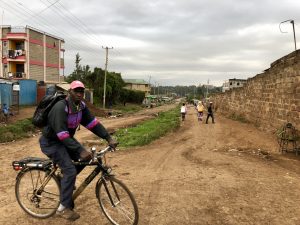
One of the roads we drove down when house-hunting for me; somehow we didn’t get a flat tire or damage the car too bad!
Nairobi is a city of extremes. There are wealthy, perfectly-manicured neighborhoods filled with mansions, and then there is Kibera, Africa’s largest urban slum. There are well maintained paved roads with street lights, and then there are “roads” which are dirt paths so rough that an ATV 4-wheeler would have difficulty getting through. There is the pristine Nairobi National Park, the only national park inside a city in the entire world, and then there are neighborhoods with open sewage and garbage streaming through the ditches alongside the roads. There are huge malls with posh department stores and Western restaurants like Burger King and KFC, and then there’s the Sam Jan Café, a restaurant the CPI Kenya team took me to that has no electricity and the lunch only costs $1.50 USD. Yet despite all of these extremes, I find myself so comfortable and at-home because of the Karibu Sana’s I have received from everyone at CPI Kenya.
After spending two days in Nairobi getting settled and taking care of things like getting a local sim card for my cell phone, stocking up on bottles of water since the tap water is not safe to drink, and getting on Nairobi time (7 hours ahead of EST), the CPI Kenya team and I were due to leave Friday morning for a field visit to a school in Meru County and then spend the weekend having a “rural experience” in the home village of Monica and Jane, two CPI Kenya members. “See you at 9am ‘Africa time’ tomorrow morning!” said Hilary, the Director and Founder of CPI Kenya. Any guesses on what time “9am Africa time” is? Turns out, it’s 11:21am! So with a not-so-early start, we hit the road for the five-hour drive to Meru County to visit a rural school that CPI Kenya is hoping to help in the future.
Watch a quick time-lapse video of a portion of our beautiful drive to Meru County here!
Driving north from Nairobi, we passed through Kirinyaga, Embu, and Tharaka Nithi Counties before reaching Meru County. The landscape was breathtaking: rolling rice fields, lush green valleys, maize farms, cows, goats, sheep, men on “boda bodas” (motorbikes) and small villages passed us by. We stopped for a meal of Ugali (corn flour cake), Kachumbari (veggie mix) and goat (yep, I ate goat!) before reaching the Moving Miracles School in Meru County.
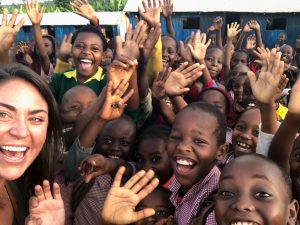
Getting to meet and play with the children of Moving Miracles School! Many have never seen a “Mzungu” (white person) before and were excited to see and meet me!
Moving Miracles is a private school for children aged 3-17 and is located in the rural village of Nkubu. Upon arrival, we visited the classrooms, attended the assembly of all the students (275 students in total!) where we were able to meet the kids, and had tea and bread and butter with the school principal, where she spoke with the CPI Kenya team about the struggles she faces at Moving Miracles and ways in which CPI Kenya may be able to help in the future.
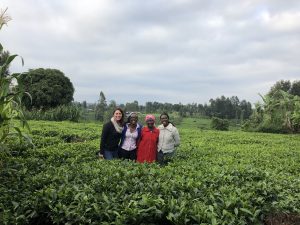
Thank you to Jane, Monica, and their mother Esther for their ‘Karibu Sana’ this weekend in their home village!
After departing Nkubu, we headed for Monica and Jane’s home village of Kagumo. Their mothers’ home is located among the beautiful valleys and hills that make up Kirinyaga County, and the home is surrounded by tea fields. The Karibu Sana I received at their house from their mother, Esther, was second to none! It was a wonderful weekend of making home-cooked meals over the fire, picking tea leaves, going to the market, and playing with the village children! Also, at the market I discovered that I’ve been drinking unpasteurized milk with my tea all week when I saw Jane buying us milk straight from the cow, so that was a fun revelation 😉
Now that we’re back in Nairobi, I’m settling into the incredible work that Children Peace Initiative Kenya does. CPI Kenya is a non-profit organization that was founded in 2011 by Director Hilary Halkano Bukuno, Deputy Director Monica Kinyua, Program Manager Jane Kinyua, and Operations Manager Caroline Karani. The idea behind CPI Kenya is that children are not just victims of conflict; rather, they are the “bridges of peace” in their families and communities that can combat and resolve inter-ethnic conflict. Hilary himself grew up in conflict as a child in Marsabit County in northern Kenya, and has recognized the power of using children as the primary actors in peace-building. With this idea, CPI Kenya has developed three main programs: the Children Peace Building program, the Heifers for Peace program, and the Interactions 4 Peace program.
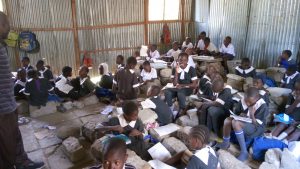
Students at R.E.C. School in the Kibera Slum. CPI Kenya has partnered with R.E.C and implemented the I4Peace program
Interactions 4 Peace (I4Peace) is a program that CPI Kenya set up in five primary schools in Nairobi that teaches children aged 9-11 about peacemaking, how to be effective problem solvers, how to be a peer mediator, and how to handle conflict. Although it is not strictly an “anti-bullying” campaign, it is similar in that it teaches the children alternatives to violence and conflict. The children are taught the five essential elements: self-awareness and confidence, cooperation, communication, conflict resolution and transformation, and parent and community connections. Once they “graduate” from the I4Peace, the students become “Peace Patrollers” in their schools. Keep in mind that these schools are different from Western schools: most of them are poor, overcrowded, underfunded urban schools. Three of the five schools that CPI Kenya works with are in the Kibera Slum (R.E.C. School is pictured above). This makes the conflicts that the Peace Patrollers mediate different than conflicts kids have in American schools and makes their work all the more important.
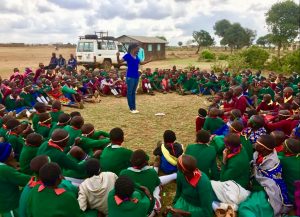
Many of these Samburu and Pokot children have successfully completed the Children Peace Building program, and they and their families are now eligible to receive their Heifer for Peace in 8 weeks if we raise enough funds!
The Children Peace Building program, which leads to the Heifers for Peace program, is how CPI Kenya started. This program is conducted in parts of the Rift Valley and Northern Kenya amongst the pastoralist tribes that are in perennial conflict over livestock, namely cows. CPI Kenya brings the children of the two warring tribes together, engages them in a series of activities that enables them to become friends, and in turn, the families of the children become friends through more activities. Not the adults, but the children become the agents for reconciliation between their two conflicting tribes. This is done through seven main activities that span 1.5-2 years, starting with a 5-day Peace Camp for the children and ending with gifting the two families with a heifer, which is the Heifers for Peace program.
Since CPI Kenya started running Peace Camps 7 years ago, there have been ZERO cattle raids amongst the tribes they worked with. That’s right, ZERO! ZERO raids and ZERO deaths since 2011; it is the longest period of peace in history amongst the Pokot and Samburu, Turkana and Gabra, and Rendille and Gabra tribes. If you’re thinking “With such incredible outcomes, why isn’t this done with every warring tribe in Kenya?!” like I initially was, the answer is because of a lack of funding. CPI Kenya has been looking for a charity or donor that can contribute long-term, sustainable funds since their last donor left Kenya in 2015, and has been mainly relying upon crowdsourcing for funds. This is one of my main tasks this summer, to help CPI Kenya get a grant and funding for the next several years so that Heifers for Peace can continue, because it truly is a model for peacemaking.
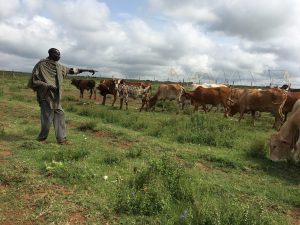
Just 1 heifer shared between 2 families from warring tribes creates economic interdependence, which sustains peace!
Heifers for Peace produces such incredible conflict resolution results because it is a grass-roots approach that promotes economic interdependence among warring tribes. With two families sharing one cow, they rely on each other for their cow to survive and to reap the economic rewards of owning a cow. A cow produces milk which they can sell, it can give birth to up to 6-8 calves, and it’s also a source of pride and honor amongst these tribes. Additionally, the cow promotes the sharing of tribal lands and resources, such as water and food for the cow. This idea of bringing warring tribes together by creating economic interdependence is groundbreaking, and I hope to be able to help CPI Kenya promote this program as a model for conflict resolution that produces social change.
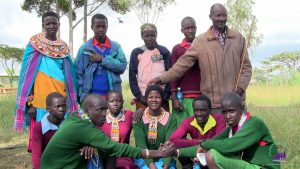
These Samburu children (in green) and Pokot children (in maroon) successfully completed the Children Peace Building program in 2015. This program included activities where their families met and eventually became friends. Now they are no longer at war, and the Samburu and Pokot family share a Heifer for Peace!
Over the next eight weeks, we hope to raise enough funds to give 50 heifers to the 100 families (50 Pokot families, 50 Samburu families) who earned a heifer over the last two years by successfully completing the Children Peace Building program. If you’d like to donate to help purchase these cows and help bring peace to Kenya, we created a Global Giving Fundraising Campaign that you can visit here, but if you could wait until July 18th to donate that would be wonderful; Global Giving is matching every donation made on that day, so your dollar will be worth more! If you do donate, your donation will go directly to the purchase of a heifer, and every dollar makes a difference! Additionally, here is a link for a funding request CPI Kenya submitted to OpenIdeo, an innovation platform committed to making positive social change; please like it and help us win this challenge to get funding!
Well I hope I haven’t lost any of you in this blog. It has been an amazing first week in Kenya and I hope you are enjoying sharing this journey with me. I feel so welcome and motivated by the members of CPI Kenya, and I hope that we can all help them in their incredible work this summer! Thanks for sticking around and I’ll see you next week 🙂
Want to see more photos and videos? Check out my Flickr album!
Cheers,
Colleen
Posted By Colleen Denny
Posted Jun 14th, 2018


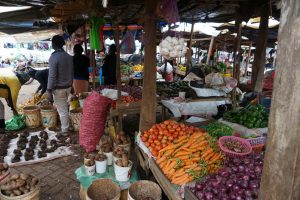
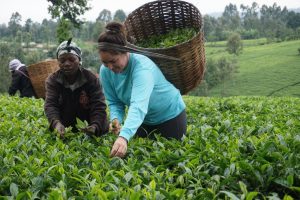
11 Comments
Samantha Givens
June 14, 2018
Colleen, what a beautiful post! I’m really impressed by the ZERO cattle raids since 2011. Thank you for sharing!
Colleen Denny
June 18, 2018
Thanks Sam! Appreciate the support!
Terri Layer
June 14, 2018
I’m looking forward to helping to buy a cow on the 18th!
Colleen Denny
June 18, 2018
Thank you Aunt Terri! July 18th, mark your calendar! 🙂
Jeannie
June 15, 2018
What an amazing experience so far, I’m so proud of you Colleen! Marking my calendar for July 18 🙂
Colleen Denny
June 18, 2018
Asante Asana, Jeannie! It will start at 9am EST, so bright and early at 6am for you 🙂
Ali West
June 20, 2018
This is so amazing, Colleen! Your time lapse video was beautiful. Let’s get those cows!
Corinne Cummings
June 20, 2018
Hi Colleen. Great blog post! Your first week in Karibu, Kenya was entertaining to read as well as inspiring. I enjoyed reading your commentary on Hilary and his experience of growing up in conflict as an adolescent. It is wonderful he can personally relate to this peace initiative through his previous life experiences. The work CPI focuses on is moving–the phrase that children are “bridges of peace” is accurate and well put. I like how CPI separates their programs into three main divisions, allowing people to specialize in their given tasks, and as a result make the most of an impact in the area. The idea of building peace is quintessential within a given community, and teaching kids at an early age, such as ages 9-11 is a great way to facilitate calm and effective problem solvers with issues that may arise. Continue the great work; I look forward to reading more. Also, fantastic pictures! Best of luck, Corinne.
Colleen Denny
June 21, 2018
Thanks Corinne, and welcome to the AP Team!
Princia Vas
June 29, 2018
Loved this blog post and the pictures complemented to it very well 🙂
Looking forward to your Instagram takeover. Best of luck!
iain
July 5, 2018
Fabulous introduction to CPI and their model! So much rich material in here that it’s hard to pick any one thing out, but as the summer progresses you’ll zero in on the essentials. In the meantime, wonderful that you’re managing to experience some of Kenya’s variety from urban energy to the tea estates…